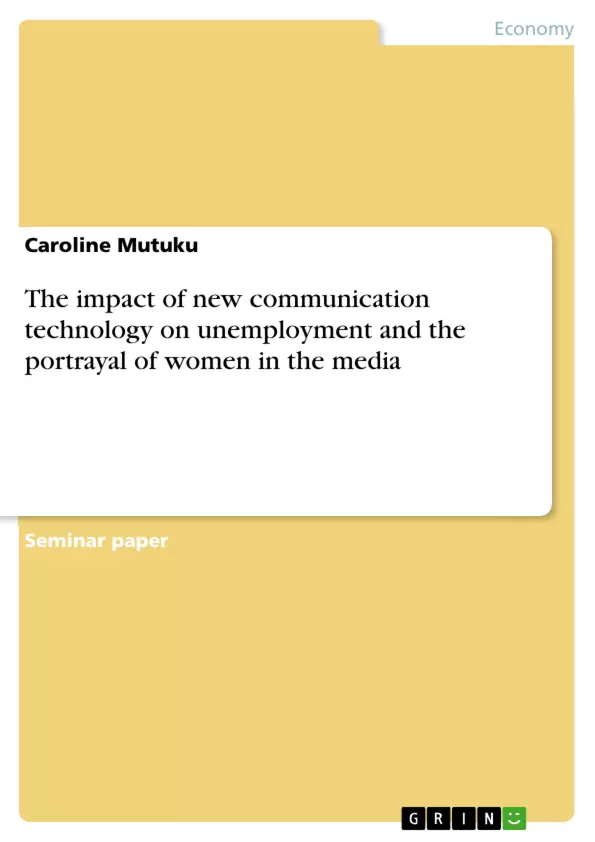The paper will discuss the impact of new communication technology on unemployment and the increased gender inequality and women portrayal in the media.
Currently, there is a renewed concern regarding the technological advancement that is feared that it may displace much of workforce and consequently create widespread unemployment, human hardship, and social disruption.
Some economists have advanced the argument that government must act to avert the loss of jobs that are likely to be replaced by technology. Opposition to technology stems from a lack of understanding of the economic usefulness of technology. The contribution of technology to economic development can only be realized if the new technology is diffused and applied. Diffusion results from the individual’s decisions in exploitation of the new technology.
Inhaltsverzeichnis (Table of Contents)
- Introduction
- Communication Technology and Unemployment
- New Economy and Technological Advancement
- Impact on Labor Market Demand
- Economic Growth and Unemployment
Zielsetzung und Themenschwerpunkte (Objectives and Key Themes)
This paper aims to discuss the impact of new communication technology on unemployment and the increasing gender inequality and portrayal of women in the media. It explores the complex relationship between technological advancements, job creation and displacement, and the broader economic landscape.
- The impact of new communication technology on unemployment
- The role of technology in shaping the global economy
- The relationship between technological innovation and labor market demand
- The economic and social consequences of technological advancements
- The increasing gender inequality and portrayal of women in the media
Zusammenfassung der Kapitel (Chapter Summaries)
The introduction lays out the context of the paper, highlighting concerns about the potential displacement of the workforce due to technological advancements. It emphasizes the importance of understanding the economic benefits of technology and its role in driving economic development. The paper focuses on the impact of new communication technology on employment and gender inequality.
The first chapter delves into the effects of information technology on unemployment. It examines the creation of a new digital economy characterized by increased labor productivity, flexibility, and adaptability. The chapter explores the fragmentation of tasks within organizations to enhance efficiency and the integration of information and communication technologies in the growth of global knowledge-based enterprises. It also discusses the historical relationship between technological advancements and employment, highlighting the tendency for technological changes to reshape the labor market demand, increasing demand in some areas while decreasing it in others.
The second chapter discusses the relationship between economic growth and employment. It delves into Okun's law, which suggests a correlation between economic growth and reduced unemployment rates. The chapter emphasizes the empirical evidence supporting the notion that increased economic growth contributes to lower unemployment levels.
Schlüsselwörter (Keywords)
This paper delves into the complex relationship between technological advancements, unemployment, gender inequality, and the portrayal of women in the media. Key concepts include information technology, new media, global economy, labor productivity, job creation and displacement, economic growth, and Okun's law.
Frequently Asked Questions
Does new technology cause widespread unemployment?
While there are fears of workforce displacement, the paper explores how technology reshapes labor demand, increasing it in some sectors while decreasing it in others, often linked to Okun's law.
What is the "New Economy" in this context?
The New Economy is characterized by digital advancements, increased labor productivity, flexibility, and the integration of global knowledge-based enterprises.
How are women portrayed in the media according to the paper?
The paper discusses increased gender inequality and the specific ways women are portrayed in the media as a result of new communication technologies.
What is Okun's Law?
Okun's Law suggests a correlation between economic growth and unemployment, stating that increased economic growth typically leads to lower unemployment rates.
Why is the diffusion of technology important for economic development?
Economic benefits of technology can only be realized if the technology is widely applied and exploited through individual and organizational decisions.
- Quote paper
- Caroline Mutuku (Author), 2018, The impact of new communication technology on unemployment and the portrayal of women in the media, Munich, GRIN Verlag, https://www.grin.com/document/427082



